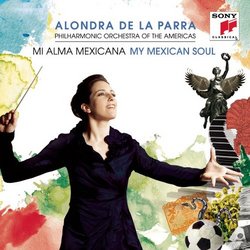| All Artists: Alondra De La Parra Title: Mi Alma Mexicana (My Mexican Soul) Members Wishing: 0 Total Copies: 0 Label: SONY MASTERWORKS Original Release Date: 1/1/2010 Re-Release Date: 8/3/2010 Genre: International Music Style: Mexico Number of Discs: 2 SwapaCD Credits: 2 UPC: 886977555527 |
Search - Alondra De La Parra :: Mi Alma Mexicana (My Mexican Soul)
 | Alondra De La Parra Mi Alma Mexicana (My Mexican Soul) Genre: International Music
|
Larger Image |
CD Details |
CD ReviewsExcellent survey of 125 years of Mexican classical music goodmusicman | USA | 08/09/2010 (5 out of 5 stars) "Conductor Alondra De La Parra's recording debut on this 2-CD set from Sony Classical features an excellent overview of Mexican classical music, from its inception in the late 19th century to the present. Parra conducts the orchestra she formed, the Philharmonic Orchestra of the Americas, in famous and lesser known works from the gamut of the Mexican repertoire, delivering first-rate, and sometimes exceptional, performances of all works featured here. Those who are looking to introduce themselves to the world of Mexican orchestral music should buy this CD set without hesitation. Most of the works featured are relatively unknown and are performed very well. Parra, who is Mexican, clearly has a close affinity for this music and these recordings convey that affinity well.
Several works are more well-known, including Revueltas's "Sensemaya" and Marquez's "Danzon No. 2," both of which were included in Gustavo Dudamel's "Fiesta" CD (a compilation of Latin orchestral music). I prefer Parra's Sensemaya, as it, like Dudamel's, is on the slower side, but succeeds in conveying both menace and excitement, while I found Dudamel's account to be lacking in the latter quality. I still prefer Enrique Batiz's account on Naxos above them all, as it is as pulse-poundingly exciting as classical music gets, with tempos nearly a minute faster than Dudamel and Parra. Dudamel toys with the tempos in Danzon, making it sound like a Latin dance piece that is only vaguely related to traditional classical music--and some may prefer it this way. I prefer Parra's, which conveys both the dance rhythms and the classical structure simultaneously. (The third major recording of this work, by Kery-Lynn Wilson, conducting the same Simon Bolivar orchestra as Dudamel, but on the Dorian label, is note-perfect but a bit too straitlaced for this kind of music.) Parra's recording of Manuel Ponce's "Concierto Del Sur" for guitar and orchestra with soloist Pablo Sainz Villegas is a fine introduction to this masterpiece (the greatest of all guitar concertos) but it is not as good as Sharon Isbin's account conducted by Jose Serebrier or the even better recording by Alfonso Moreno conducted by Enrique Batiz. (This has nothing to do with Parra's conducting of the work but rather with the less than ideal balance between guitar and orchestra as well as the soloist lacking some of the unique qualities that Isbin and Moreno bring to the work.) Moncayo's "Huapango" (very famous in Mexico) is given a bristling performance full of life and enthusiasm. It slightly edges out Batiz's recording on Naxos for sheer exuberance. Chavez's El Tropico (from his H.P. Suite) is given a marvelous performance here, as is the wonderfully atmospheric "Imagenes" (from 1927) by Huizar. The remaining works give the listener an overview of the earliest period of Mexican music (the first work on this set dates from 1884), which mimicked the European style, all the way up to a work (for piano and orchestra) from 2006 by Toussaint, which is perhaps the greatest "find" on this set, a neo-Romantic work with jazz influences. Several works included here convey the brusquer side of Mexican music, but nothing here is atonal ala Schoenberg. The most modern works sound like Stravinsky at his most muscular. The playing of the orchestra is very fine throughout but it is not up to the standards of the best ensembles. This is probably due to its youth, having been created by Parra in 2004, and most of its members being under the age of 35. Undoubtedly, each new performance and recording will help raise the orchestra's standards. (It is also a bit smaller than many orchestras, which is noticeable in the smaller string sound and less powerful brass section--although these are minor quibbles, not fundamental flaws.) The sound quality varies from excellent to merely okay, which is odd given that all recordings were made in the same location in New York. Neverthless, as a whole, this is a most impressive debut for both conductor and orchestra and one can only hope that they will continue with more recordings of the Latin repertoire (which was Parra's goal when she founded the orchestra) and eventually a broader repertoire. For those who are looking for the next Gustavo Dudamel, whose musical instincts and talents may well exceed his, look no further: it is Alondra De La Parra!" |

 Track Listings (8) - Disc #1
Track Listings (8) - Disc #1